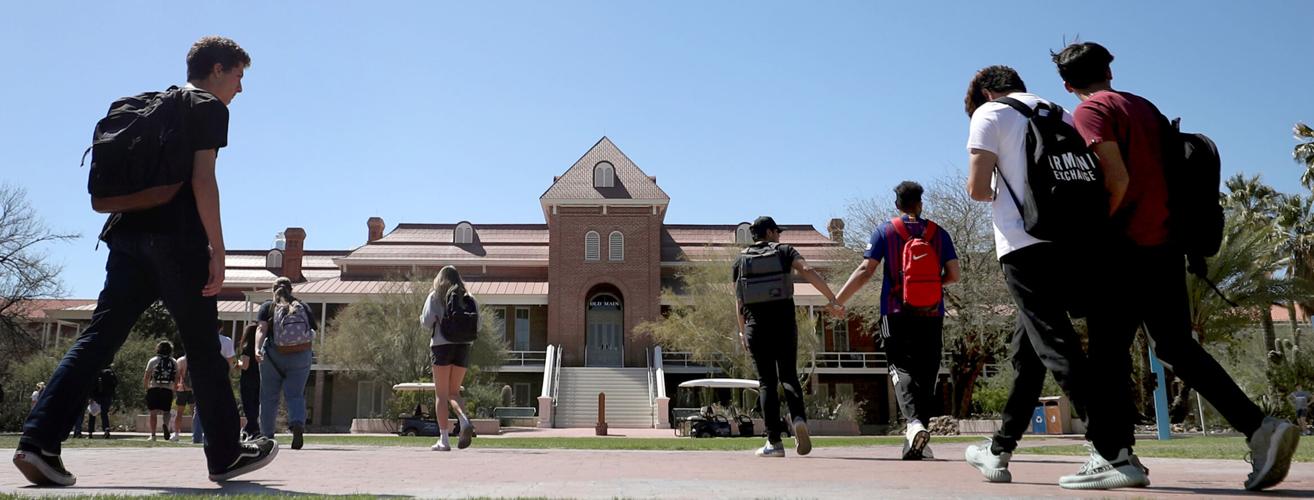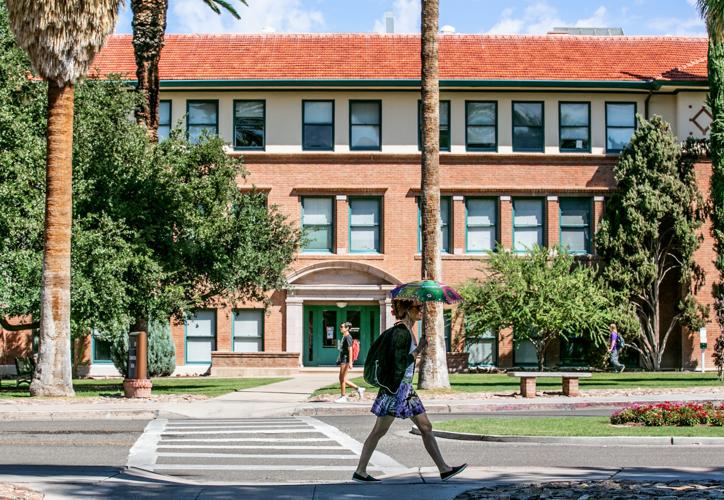Despite political backlash, the University of Arizona is standing firm in its commitment to its diversity, equity and inclusion efforts, which the school says are key to its recruitment and retention strategy.
“Legislators are attempting to legalize censorship,” says a resolution the UA Faculty Senate passed in April, written in opposition to a proposed legislation that would have made it illegal for Arizona’s public colleges and universities to spend money on, or require participation in, DEI programs and initiatives.
“This bill infringes on freedom of speech and our civil rights and liberties. ... (It) not only impinges on our ability to investigate, invent, discover and to give account but also infringes our right to publish, teach, and research in and outside the classroom without interference or fear of reprisal,” the faculty statement says.
In both 2021 and 2022, the UA spent $1.6 million a year out of its more-than $2 billion budget to support an administrative unit known as the Office of Diversity and Inclusion, whose goal is to “make diversity and inclusiveness a habit that is implemented and practiced by everyone consistently throughout the university.”
Why DEI is under attack
According to the Chronicle of Higher Education, 21 states, including Arizona, introduced some form of legislation that would put restrictions on DEI programs in 2023. As of June 1, lawmakers in Florida, Tennessee, North Dakota and Texas had passed some of those proposals into law.
But it’s not happening in Arizona, at least not this year anyway.
Arizona’s Senate Bill 1694 narrowly failed to make it out of the House last month. Republican Sen. Jake Hoffman from Queen Creek, who sponsored it with six Republican co-sponsors, did not respond to the Arizona Daily Star’s request for comment on the failure of the bill or any plans to file a similar bill next year.
When the bill was still moving through the Legislature, Hoffman said DEI trainings that schools like the UA regularly offer, which his bill would have outlawed, “have become a prevalent tactic of the left to shame employees and to shame folks within the trainings,” Capitol Media Services reported. Eliminating such trainings, Hoffman added, “gets us back to doing the job that they’ve been hired to on behalf of the people.”
“The bill says we don’t want public entities influencing the composition of their workforce based on race,” Hoffman said.
The legislation would also have barred public institutions from advancing theories of unconscious or implicit bias, cultural appropriation, and anti-racism, among numerous other theories that touch on the marginalization or oppression of certain social, racial, ethnic and gender groups.
Advocates say DEI programs and trainings can help foster a more welcoming campus environment in addition to bolstering recruitment and retention efforts.
Democratic Sen. Priya Sundareshan of Tucson called Hoffman’s bill “incredibly hurtful,” and said DEI initiatives “help people and employees and students feel comfortable where they are.”
If the political tides in other Republican-dominated state legislatures are any indication, the push against DEI in Arizona likely won’t die with this year’s bill.
Over the past few years, some conservative politicians in Arizona — and across the nation — have criticized educators at all levels for “indoctrinating” students through certain teachings, accusations sometimes broadly referred to as critical race theory. Although that term has taken on new meaning as a conservative euphemism for teaching America’s history of discrimination against people of color, women, members of the LGBTQ community and other marginalized groups, critical race theory itself is a 40-plus-year-old, graduate-level concept rarely applied to high school or undergraduate courses.
Eliminating DEI offices and programming, which are typically designed to help historically marginalized students matriculate and succeed in higher education, has surfaced in the national political culture wars as one of several proposed and enacted strategies — others include banning certain books and courses — to assert political control of ideologies taught or promoted in schools.
“If you look at the way this has actually been implemented across the country, DEI is better viewed as standing for discrimination, exclusion and indoctrination,” Florida’s Republican Gov. Ron DeSantis said at a news conference last month after signing Senate Bill 266 into law.
Just like the failed proposal in Arizona would have, the new Florida law prohibits public colleges and universities from spending money on DEI initiatives. “That has no place in our public institutions,” DeSantis said.
UA, other schools defend DEI
Arizona faculty leaders disagree.
Faculty senates at the UA, Northern Arizona University and Arizona State University have passed non-binding resolutions in support of investments in DEI as critical to the operation of accessible higher education in a state with an increasingly racially and ethnically diverse population.
According to the 2020 U.S. Census, Arizona’s diversity index is 61.1%, up from 54.9% in 2010; 61.6% of Arizonans identify as white, 12.4% identify as Black, 18.7% as Hispanic and 10.2% as multiracial.
The U.S. Department of Education designates the UA as a Hispanic Serving Institution because 25% or more of its full-time, undergraduate student body identifies as Hispanic, and the university has launched numerous programs to recruit more low-income and first-generation students as well as underrepresented faculty.
The university hired its first diversity officer in the mid-2000s. According to UA spokeswoman Pam Scott, UA created the role “to help develop teaching strategies for students from diverse backgrounds and to perform research to address the needs of a diverse society.“
Since then, the UA has significantly grown its investments in DEI initiatives. As of November 2022, “more than $2.8 million has been allocated to advancing campus racial equity efforts that are aligned with student priorities,” the UA provost’s website says.
Creating or expanding an office to administer DEI programming and support is something many colleges and universities have done over the past decade. According to a 2019 analysis by the education trade magazine INSIGHT Into Diversity, American colleges increased spending on DEI initiatives by 27% between 2014-2019. However, even with those increases, DEI accounted for an average of 0.5% in a school’s overall budget.
Sometimes, these investments in DEI have come after public criticisms of a campus’ intolerance of marginalized students or faculty. It happened at the University of Missouri in response to weeks of high-profile, anti-racism campus protests in 2015. Although it didn’t receive near the media attention, one year later in 2016, students at the UA raised concerns about the treatment of marginalized students on campus during a faculty listening tour.
“I felt scared and unsafe, like maybe someone would show up in the night and try to do something to me,” a Black UA graduate student said at the time, as she recalled finding a racial slur written on her mailbox. “I didn’t really know what to think because nothing like that had ever happened to me before.”
Asian, Native American, Hispanic, transgender and female students also reported discrimination or harassment from faculty members and fellow students, the Arizona Daily Star reported in 2016.
Soon after the revelations of the listening tour, the UA hired two new diversity officers and expanded the scope of its Office of Diversity and Inclusion.
Among other functions, the office provides support for outreach and retention efforts, provides resources to those reporting bias concerns, and is in the process of developing a diversity strategic plan. It’s working with departments and other units across campus to, according to its website, “move even further beyond rhetoric towards sustainable, accountable, action-oriented practices.”
The UA’s Office of Diversity and Inclusion “is one aspect of a multipronged approach to recruiting, retaining and supporting students and faculty from diverse backgrounds,” Scott said. “As the incoming classes have increased in size and diversity year after year so has the academic preparation which has helped lead to higher first-to-second year student retention.”
In 1980, about 10% of the UA’s student body identified as non-white. In 2022, 34% of students identified as a race other than white and 25% identified as Hispanic or Latinx.
According to numbers provided by the UA, first-to-second year retention rose from 83.3% to 85.6% between 2017 and 2022.
Data from the UA’s Office of Equity and Inclusion also shows that between 2012 and 2021, retention rates improved for biracial, white, first-generation and low-income students, among other groups.
View from DEI-banned Florida
Those are the kind of gains Andrew Gothard, an English instructor at Florida Atlantic University, said he and his colleagues are most worried about losing now that DEI initiatives are outlawed in Florida.
From his view as an instructor who’s interacted with students for more than 10 years, diversity, equity and inclusion programs are “unequivocally good for higher education,” and proven to help more students from underrepresented backgrounds attend and graduate from college.
“When students are no longer getting higher education degrees, they aren’t pouring that knowledge and experience and expertise back into their (communities) and that’s something that hurts everyone,” said Gothard, who also serves as president of the United Faculty of Florida. “We’re deeply concerned about the long term impacts this will have not just on the individual students but the totality of Florida in the coming decades.”
He said he’s already heard from students, parents and faculty who, in part because of Florida’s DEI ban, are either looking to leave the state or reconsider their intentions to get an education at — or work for — a Florida university.
Gothard’s message for Arizona’s higher education leaders is to find out what its campus communities actually want and need despite the “extreme, false partisan narrative” circulating about DEI programs.
“Get out there and counter that public narrative of what DEI — and higher education in general — actually do,” Gothard said. “When you do that, you’re going to put the people listening to both sides of this argument in a place where they have to decide what they want.”
The NAACP says new laws and policies championed by Florida Gov. Ron DeSantis are "openly hostile" to Black Americans, people of color and LGBTQ+ individuals. It has issued a travel advisory accusing the state of "trying to erase Black history and to restrict diversity, equity, and inclusion programs in Florida schools."





